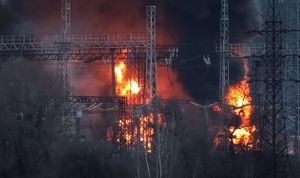Zimbabwe's parliament was unexpectedly plunged into darkness right as Finance Minister Mthuli Ncube was concluding his 2025 budget speech, creating what can only be described as chaos and sheer disbelief among lawmakers present. The dramatic moment happened on November 29 at the Mount Hampden parliamentary building, right after the minister announced pivotal economic measures and forecasts for the coming year.
Top officials, including President Emmerson Mnangagwa and Vice-President Constantino Chiwenga, sat bewildered as the lights flickered and eventually went out, prompting uproar among opposition MPs, who seized the moment to shout, "State of affairs! State of affairs!" This reaction underscored their viewpoint on the dire circumstances surrounding the nation’s economy.
Indeed, Zimbabwe has been grappling with severe energy shortages, with power cuts extending for as long as 20 hours on some days. These outages are largely attributed to low water levels at the Kariba Dam, the country’s primary source of hydroelectric power, exacerbated by prolonged drought conditions. Meanwhile, the coal-fired Hwange power station has also been facing maintenance issues.
Following the incident, the Parliament issued an apology to the president, explaining the blackout’s cause. According to officials, thunderstorms and high winds had triggered tripping at the 132kV feeder supplying the area. The seat of government showed its vulnerability when even backup systems failed; the generator at the parliament had its settings disrupted, preventing it from kickstarting automatically. Thankfully, after manual intervention, power was restored within five minutes, but not before social media erupted with reactions. Many interpreted the power cut as emblematic of state incompetence, using humor and satire to highlight the government's failure to provide reliable services.
Before the interruption, Minister Ncube had painted a challenging picture during his address, forecasting the agricultural sector to contract by 15% due to already impacted harvests from the unrelenting drought. Yet, he remained optimistic about the economy's projected 6% growth for next year, banking on hopes for improved rainfall, which would, if realized, contribute to more stable power generation.
Ncube's comprehensive budget plan outlines several policy shifts, including the introduction of taxes on gambling winnings and the freezing of government hiring outside key sectors like health and education. This indicates the government's attempts to generate additional revenue amid dire economic strains, where nine months of remittances sent home by Zimbabweans abroad totaled over US$1.9 billion. The Finance Minister initially urged patience, asserting plans were underway for economic stabilization.
Economically, Zimbabwe has witnessed its mineral revenue forecast slump by 10% to approximately R100 billion, directly impacted by the crippling power outages. Reflecting this reality, Ncube described the persistent load shedding as weighing down on growth potential and the country's overall economic competitiveness.
Simultaneously, the government is under pressure to meet salary obligations, as seen with teachers expressing concerns over the delay of their annual bonuses—typically paid within the local currency, Zimbabwe Gold. The Zimbabwe Teachers Association has voiced its discontent, labeling the postponement as a breach of trust between the workers and the administration, especially as the end-of-year financial responsibilities loom large for many families.
Despite the overwhelming challenges, government officials and economists alike are cautiously hopeful, speculating about the potential for 2025 to herald improvements. Ncube's optimistic growth forecast hinges on stabilized rains reverting back to dependable agricultural outputs which, concurrently, would ease electricity restrictions as hydroelectric generation rebounds.
The parliament’s unexpected blackout during such significant proceedings serves as metonymy for Zimbabwe’s broader systemic troubles, encapsulating both the frustrations and the challenges currently shaping the nation. With energy shortages impacting both the political and economic life of the country, Zimbabwe remains at a crossroads, needing strategic decision-making to pivot toward recovery. Can the government rise to the occasion and address these debilitating issues effectively?"



